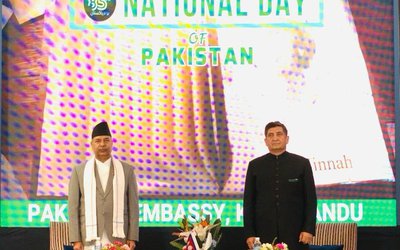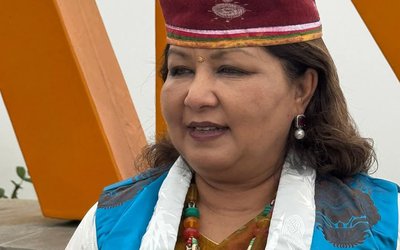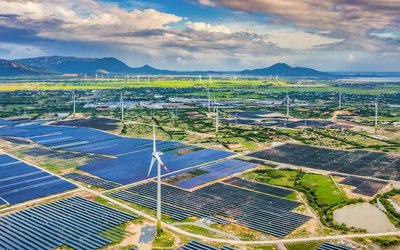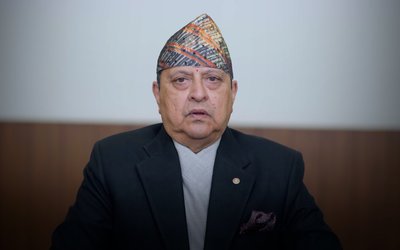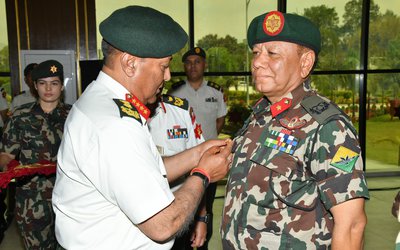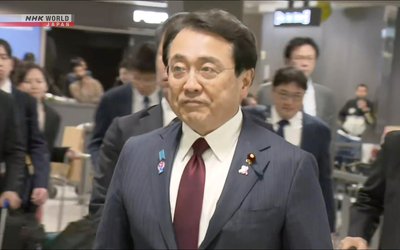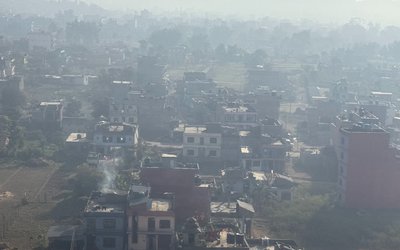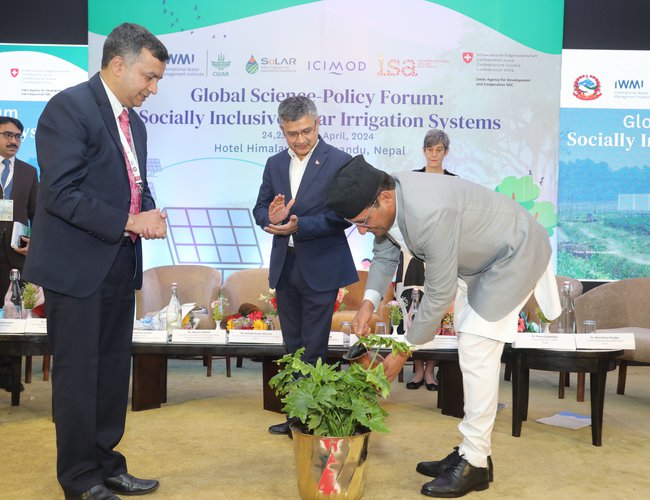
Following three days intense discussions on important issues three days Three-day Global Science-Policy Forum on Socially Inclusive Irrigation Systems concluded.
The international forum covered various topics related to solar energy, including community empowerment, gender equality, and inclusive policies for sustainable energy.
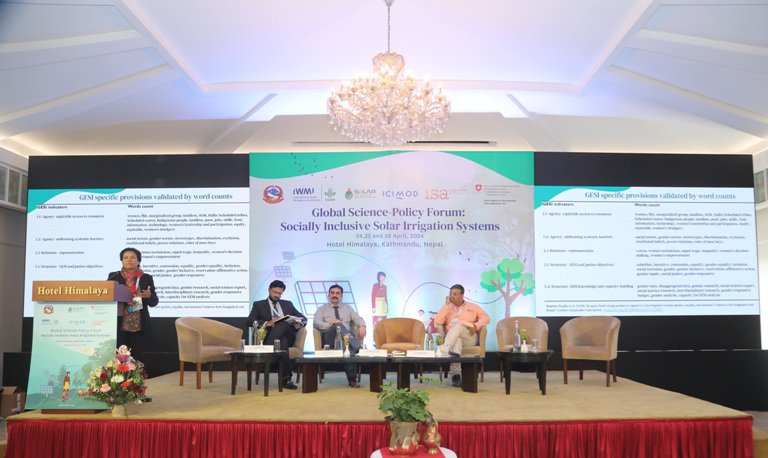
Three-day Global Science-Policy Forum on Socially Inclusive Irrigation Systems is being organised by International Water Management Institute (IWMI) and its partners International Centre for Integrated Mountain Development (ICIMOD), International Solar Alliance (ISA), Alternative Energy Promotion Centre ( AEPC), as a part of Swiss Agency for Development and Cooperation (SDC) funded project titled Solar Irrigation for Agricultural Resilience in South Asia (SoLAR- SA).
The conference is taking place at Hotel Himalaya, Kathmandu from 24 April to 26 April. This forum has brought around 150 key stakeholders from across the world to discuss the growing body of work and evidence in South Asia on solar applications in agriculture, particularly bringing together key experiences, insights and promotion of south-south collaboration and scaling up of global ambitions around effective and sustainable use of solar energy in agriculture.
The Global forum was inaugurated by Shakti Bahadur Basnet, Ministry of Energy, Water Resource and Irrigation, Nepal. “Pressing challenge of climate change calls for a need for climate mitigation awareness to end our dependence on fossil fuels and move towards clean and renewable energy.
There is a need for low carbon methods like solar irrigation. Also, the 2023 National Policy aims for economic prosperity climate adaptive irrigation including solar irrigation,” said the Hon’ble Minister. “Co-creation of knowledge with local governments and local stakeholders to promote inclusivity of solar irrigation projects. This will bridge the gap between science and policy. Women and socio-economically disadvantaged farmers must be at the centre of planning,” Mr Keshab Kumar Sharma, Secretary, Water and Energy Commission Secretariat, Nepal.
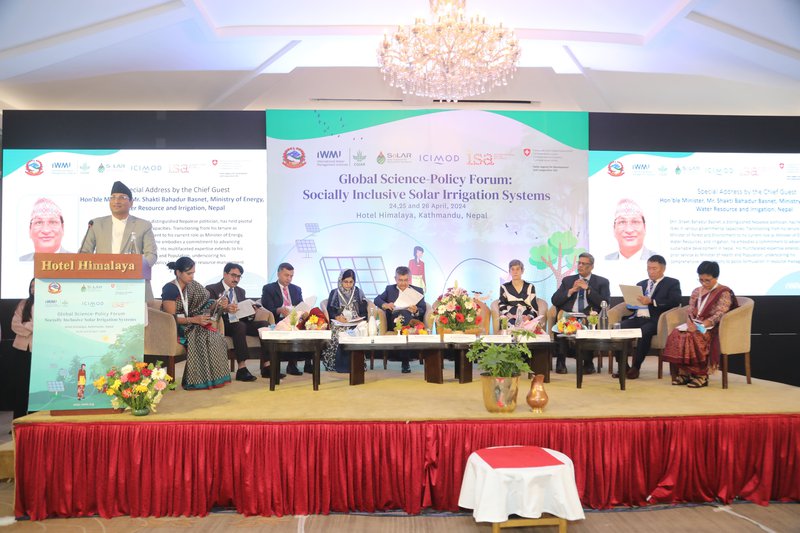
Dr. Manohara Khadka, Country Representative, IWMI Nepal, highlighted the benefits of Solar Irrigation for women farmers, “Solar irrigation can support women farmer’s climate resilience capacity and must be inclusive and sustainable.” “Out of 449 billion cubic metre groundwater resource, 242 billion cubic metre is extracted annually which is 59% of the resource in India” stated Dr. Sunil Kumar Ambast, Chairman, Central Ground Water Board, Government of India. “Hence, progressive interventions need to ensure livelihood stability and sustainability.”
Dr. Danielle Meuwly, Ambassador of Switzerland to Nepal, Embassy of Switzerland, highlighed “Innovative technology is the solution to the challenges we face. Research to policy should be the aim of the global forum, hence this south-south knowledge exchange will raise important policy questions.” “Solarization in addition to Hydropower development in Pakistan is of utmost importance to have the capacity to compete with the rest of the world's economy “, stated Engr.
Asghar Ali Halepoto, Chief, Water Resource Section, Ministry of Planning, Development & Special Initiatives, Government of Pakistan. Ms. Munira Sultana, Chairman, SREDA, Govt. Of Bangladesh, highlighted the importance of Solar Irrigation for South Asia, says “Grid connected Solar Irrigation Pumps ( SIPs) will create electricity surplus relieving the Government’s pressure to provide electricity.
Solar irrigation is very important for the South Asia.” Dr. Darshini Ravindranath, Project Lead-SoLAR, IWMI, stated“Needs and preferences of small marginalised and women farmers need to be considered for better project outcomes.
This forum will highlight findings of our work and share south-south collaborative ideas to develop a roadmap for SIP policy and implementation.”
Dr. Pema Gyamtsho, Director General, ICIMOD highlighted the importance of strategic interventions and investment inflow to pilot successful initiatives and enhance agricultural productivity.
He says, “ICIMOD emphasizes the urgent need for modernizing agriculture and implementing solar water systems to ensure food security in the face of climate change challenges.”
The Global forum explored various plenary and parallel sessions with presentations and diverse panels under four key thematic areas such as groundwater sustainability, adaptation and mitigation, business models of SIPs and scaling up of solar irrigation, the role of communities: capacity building and gender, equity and social inclusion and designing effective and inclusive policies for solar energy transitions.
It presented unique insights on the effectiveness of solar irrigation as a strategy to sustainably manage water, energy, food, and climate (mitigation and adaptation) interlinkages. It highlighted how governments are using evidence from the field to develop and deploy ambitious policies and programs on solar irrigation to address nationally determined contributions (NDC) commitments while supporting climate-resilient, genderequitable, and socially inclusive agrarian livelihoods.
- 550,000 Students' Future At Stake Due To Teachers' strike
- Apr 17, 2025
- Weather Forecast: Mainly Fair To Partly Cloudy In Kathmandu, Lumbini, Madhesh and Surkhet
- Apr 17, 2025
- Pakistani Embassy In Kathmandu Hosted A Reception On 85th National Day
- Apr 16, 2025
- Earthquake Rocks Kathmandu Valley
- Apr 16, 2025
- Prof Dr Khadga KC assigned responsibility of TU Vice Chancellor
- Apr 16, 2025

